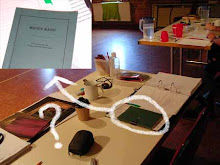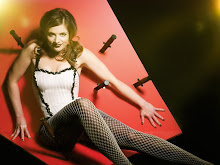 Today is the final day of the 4 week rehearsal period. After this most of the rehearsing will be done in the theatre. Time sure flies. The poll on whether 4 weeks rehearsal is enough time gave the result that 54% thought it was too short. I might re-poll the same question next week to see whether opinions have changed over the course.
Today is the final day of the 4 week rehearsal period. After this most of the rehearsing will be done in the theatre. Time sure flies. The poll on whether 4 weeks rehearsal is enough time gave the result that 54% thought it was too short. I might re-poll the same question next week to see whether opinions have changed over the course.As per the pattern established over the last few days of rehearsal, today will be all about detailing important scenes. The post from Day 18 will give you an insight into how this goes if you didn't read that post.
I drop down to Wardrobe again to see how they're going. Amanda and Kate are working extraordinarily hard, and say they're on schedule, which means also working on the weekend. That's the nature of this kind of work; it's gotta be ready when it's gotta be ready.
Kate is dying some of the corsetry that Amanda was sewing up last time I was down there. Amanda tells me that making the underwear for this show has been incredibly time consuming. The amount of sewing is extreme. How extreme? Well, so far she's used 2 and a half kilometres of thread. 2 and a half kilometres of thread! (I know I'm repeating myself, but I'm trying to get my mind around it.) A handful of finished costumes hang around the studio, including Allarkini's robe, which looks pretty amazing.
She also volunteers that the actors seem more comfortable now. This is an interesting comment; of course it's the make-up and costumers who the actors unload all their worries and concerns upon. If things have calmed down for Amanda and Kate on that front, it's a good sign.
There is activity on a lot of different fronts today; everybody understands that the time available to work through issues is contracting with every minute.
Lawrence is here again today. I spend some time in the Shell Room with him, Jonathon, Darren and two of the actors [names withheld for magic security reasons]. The way Lawrence works is brilliant. His is a very technically specific craft, yet the way he chooses to employ the techniques are built purely on his imagination and connection with the show. The scene he is working with the actors on at the moment is based upon one line in the stage directions of the play. It has been Lawrence's job to understand the characters, interpret the timbre and atmosphere of the scene, and then construct how this single line is best to be realised.
The way Lawrence moves is very fluid and he is highly physically controlled. The way he directs the actors is a very carefully balanced combination of choreographic precision, with instruction on how they need to play the scene to convey what is 'real.' He is patient and generous, and as he describes how he has constructed the scene with the limitations of the actors' experience and the world of this particular show in mind, the enormous complexity of his task and the skill with which he's achieved it comes into view.
I also take some time to speak with Mark Jones, the composer and Musical Director of the show. Our conversation is far-reaching and raised some really brilliant insights into the work. I've decided to report on our conversation in two parts, because I can't possibly fit it into a single post. Also, some of what we talked about in relation to how the music works in the piece as a whole might be useful contextualised within the how the piece is shaping up for the first preview on Friday night.
Mark joined the project very early on as a musician and musical director. When he joined the project for the first development period he says there was no plot and no narrative; just a broad concept and some early character sketches.
Mark's character, Bones, the 'black faced' piano playing 'end man' existed very much in the way that he does now. Other characters have come and gone from different drafts, and others have always been in the script in some form, but have had significant evolution. The essence of the Bones character has remained quite constant from the beginning as Mark sees him.
The songs are such an important part of the piece. I ask him about the evolution of their composing. Mark says that in the first development he played existing music, but since that first development he's worked on and off on composing original songs for the show in collaboration with Chris, Lally and Maryanne.
The songs have begun from varying starting points. Some of them began with a melody that Mark created, o
 thers started from the idea for a scene in which they're central, others started with written text from Chris and/or Lally. In some ways they are still developing as verses or choruses get added and cut in accordance with how they are working in the show.
thers started from the idea for a scene in which they're central, others started with written text from Chris and/or Lally. In some ways they are still developing as verses or choruses get added and cut in accordance with how they are working in the show.I ask Mark whether the songs are 'period' songs, and how he has dealt with that issue. His response echoes that of both the set and lighting designer. Much of the music he has written has a kind of a Rag Time feel, but it is not precisely music of the period and genre. Strictly speaking, the recordings of vaudeville artists of the time reveal simpler music, and quite a lot of talking with the piano underneath.
Mark's says his composition is definitely more musically sophisticated than the recordings of the music of the time that exists today. Like Jonathon and Richard, Mark has gone for a 'sense' of period, but has not been bound by historical 'fact' in what he's provided to the production.
The production must be resonant and interesting for today's audience. This mean
 s a 'sense' of period is better than historical accuracy in the case that the historically accurate music style does not serve the production. But the lines of what 'serves' the play and 'works' for an audience is not as clear as this statement suggests. For example, fuzziness in the period of music has been deemed okay, but last week they were researching the exact date the 'Dryzabone' coat was introduced. In the case of the coat the sense of historical accuracy that 'served' the play was understood to be far more literal.
s a 'sense' of period is better than historical accuracy in the case that the historically accurate music style does not serve the production. But the lines of what 'serves' the play and 'works' for an audience is not as clear as this statement suggests. For example, fuzziness in the period of music has been deemed okay, but last week they were researching the exact date the 'Dryzabone' coat was introduced. In the case of the coat the sense of historical accuracy that 'served' the play was understood to be far more literal.These thresholds for accuracy clearly exist in all artistic works. Some 'facts' are considered sacred, some are considered malleable, and some just aren't considered much at all. How these lines get drawn is not always clear; partly they are decided by individual artists, partly by community 'standard,' partly on an individual basis by every audience member who accepts or rejects how these elements work within the piece.
Why it 'works' that the historical accuracy for some things can be massaged, but the accuracy for something else cannot is an interesting question. But theatre artists will say that their 'sense' that something is or isn't working in relation to its historical accuracy is very clear to them.
Chris phrase of the day; “Does anyone know where the invisible thread is?”




No comments:
Post a Comment